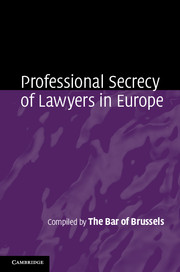Book contents
- Frontmatter
- Contents
- Contributors
- Preface
- 1 Professional secrecy in Europe
- 2 The CCBE rules on professional secrecy
- 3 Austria
- 4 Belgium
- 5 Bulgaria
- 6 Cyprus
- 7 Czech Republic
- 8 Denmark
- 9 Estonia
- 10 Finland
- 11 France
- 12 Germany
- 13 Greece
- 14 Hungary
- 15 Iceland
- 16 Ireland
- 17 Italy
- 18 Latvia
- 19 Liechtenstein
- 20 Lithuania
- 21 Luxembourg
- 22 Malta
- 23 The Netherlands
- 24 Norway
- 25 Poland
- 26 Portugal
- 27 Romania
- 28 Slovakia
- 29 Slovenia
- 30 Spain
- 31 Sweden
- 32 Switzerland
- 33 United Kingdom
- Index
- References
17 - Italy
Published online by Cambridge University Press: 05 June 2013
- Frontmatter
- Contents
- Contributors
- Preface
- 1 Professional secrecy in Europe
- 2 The CCBE rules on professional secrecy
- 3 Austria
- 4 Belgium
- 5 Bulgaria
- 6 Cyprus
- 7 Czech Republic
- 8 Denmark
- 9 Estonia
- 10 Finland
- 11 France
- 12 Germany
- 13 Greece
- 14 Hungary
- 15 Iceland
- 16 Ireland
- 17 Italy
- 18 Latvia
- 19 Liechtenstein
- 20 Lithuania
- 21 Luxembourg
- 22 Malta
- 23 The Netherlands
- 24 Norway
- 25 Poland
- 26 Portugal
- 27 Romania
- 28 Slovakia
- 29 Slovenia
- 30 Spain
- 31 Sweden
- 32 Switzerland
- 33 United Kingdom
- Index
- References
Summary
Preliminary note
In Italy, the duty of confidentiality is very broad and it is the lawyer's primary duty, other than respecting the law, to keep secret all pertinent information in legal matters provided to the attorney or coming to the attorney's knowledge in the course of providing legal advice or assistance. In Italy, unless a breach of confidential information can be justified as fitting within the limited exceptions provided in applicable laws and ethical provisions, the lawyer's duty of confidentiality prevails.
The duty to preserve a professional secret is imposed upon regulated legal professionals who are authorised to pursue their professional activities under the professional title of ‘lawyer’ (avvocato) who are registered with the Bar Association (Consiglio dell’Ordine) where they have their domicile or practice). In Italy, there is a bar association in each judicial district (circondario di Tribunale) composed of a variable number of members, depending on the number of registered lawyers. The duty of confidentially also applies to attorney trainees (praticanti avvocati) who are juris doctors spending at least eighteen months training with a law firm and are enrolled in a special register held with the competent bar association.
- Type
- Chapter
- Information
- Professional Secrecy of Lawyers in Europe , pp. 270 - 289Publisher: Cambridge University PressPrint publication year: 2013



